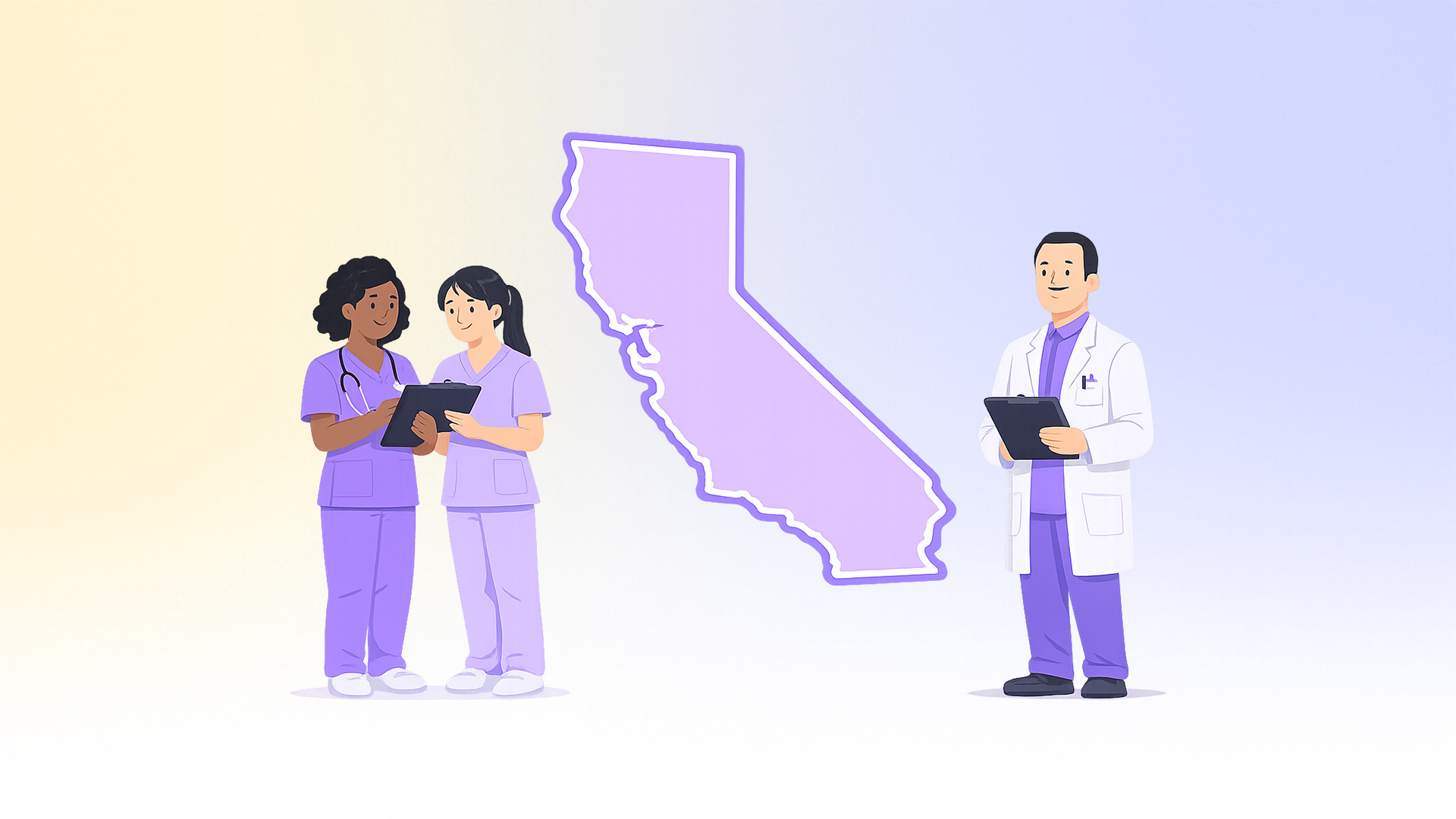A Doctor of Nursing Practice (DNP) is the highest clinical degree in nursing, designed to prepare nurses for advanced practice, leadership, and healthcare system innovation. Unlike a PhD, which focuses on research, the DNP emphasizes evidence-based clinical care, policy, and leadership. For many nurses, it’s the next step to expand their scope, increase earning potential, and shape healthcare beyond the bedside.
TL;DR – Should You Get Your DNP? Here’s What to Know
- A DNP is the highest clinical degree in nursing. Unlike a PhD (which focuses on research), a DNP prepares you for advanced clinical practice, leadership, and healthcare systems innovation.
- You don’t need an MSN to start. Many programs accept BSN-prepared nurses directly into DNP tracks, offering a path to doctoral education without a master’s degree first.
- DNPs earn more. With average salaries around $117,859 and top earners making over $180K, DNPs often command higher pay and leadership roles.
- It’s not just about the title. DNP programs focus on policy, quality improvement, and evidence-based leadership—ideal for nurses looking to shape systems and move beyond the bedside.
- It depends on your goals. If you want to teach, lead, or run your own practice, a DNP can open doors. But if your passion is direct patient care, an MSN might still be the right fit.
Reaching the Next Step in Your Nursing Career: The DNP Path
For many nurse practitioners, the journey of nursing education doesn't end with a master's degree. As the healthcare system evolves, you might find yourself at a crossroads, wondering about the next step in your nursing career. This is a common experience for nursing professionals like you.
If you're contemplating further advancement in your nursing practice, you may have considered pursuing a Doctor of Nursing Practice (DNP) - a terminal degree. But you might be asking yourself, "Should I get my DNP? Is it the right choice for me?"
In this post, we'll give you some reasons why obtaining a DNP degree could be a smart move for your nursing career. We'll delve into what a DNP is, how it differs from other advanced degrees in nursing, and what the journey to becoming a DNP-prepared nurse looks like. Whether you're a family nurse practitioner, a psychiatric nurse practitioner, or in another advanced practice role, this guide will help you make an informed decision about your future in nursing leadership and advanced clinical practice.
Let's start by breaking down what a DNP is and how it fits into the landscape of advanced nursing education.
What is a DNP?
When you go to college, normally, the first degree you can get is an undergraduate degree. This is the basic 4-year diploma that allows you to become a professional. After this, there are post-graduate degrees that you can choose to pursue.
The most common path for anyone that goes to college is getting their undergraduate degree, then a master's degree, and then a doctorate degree, or PhD. For nursing students, this can be a little different. Nurses have two types of terminal degrees that they can get:
- A DNP (Doctor of Nursing Practice)
- A PhD (Doctor of Philosophy) in Nursing
Though they might look similar, they are not the same. The main difference is this: A DNP prepares you to practice at the highest level of nursing education. This is the primary focus. A PhD, on the other hand, prepares you not for practice, but (usually) for academic research.
We should say that there is some overlap between the two degrees. You can do research with a DNP as well.
The path of the PhD student is very important. After all, academic research helps us to provide better patient care. However, in this article we'll focus on the DNP, since that degree tends to be the one most students have questions about.
So, after reading this, you might be wondering. Which one is better? Can I get both?
The short answer is that neither is better than the other. It depends on what you want to do as a nurse. And yes, you can get both titles if you choose to do so (which is very ambitious, so kudos to you!)
If you want to learn more about the differences between a Nursing PhD and a DNP degree, check out this article by the School of Nursing at Duke University.
Thinking about advancing from MSN to DNP? Many NP students start exploring clinical placement options early to avoid delays. Create your free NPHub account today and get matched with vetted preceptors who’ll support you on your doctoral journey.”
Who can get a DNP?
As we wrote above, a doctoral degree is a terminal degree that people get once they have completed their master's degree. It's usually a three-step process. However, for nurses, the path to a doctoral degree is a bit different.
Any nurse who has a bachelor's degree has the opportunity to get a DNP, even if they don't have their master's degree. There are some programs out there that will lead you straight into the DNP title.
This is why many nurses ask themselves: which degree should I get? An MSN or a DNP? And is it worth it to get a DNP if i'm already a nurse practitioner with a master's degree?
To answer this, it's important to know the difference between the two, so let's talk more about what exactly you can get with a doctorate in nursing.

What are the benefits of getting a DNP?
Higher salary: One of the key benefits of earning a Doctor of Nursing Practice (DNP) degree is the potential for a higher salary. While in the past the difference compared to a master's degree may have seemed small, today it’s a meaningful advantage.
As of 2025, the average annual salary for a DNP in the United States is approximately $117,859. Top earners can make up to $185,000 per year, while those in the 75th percentile earn around $134,500 annually. Even at the 25th percentile, DNP nurses are earning about $94,500 per year, a strong testament to the value of advanced education.
Compared to nurses with only a master’s degree, DNP-prepared nurses typically enjoy greater earning potential, reflecting their advanced clinical skills, leadership training, and broader career opportunities.
More job opportunities: Some hospitals look for nurses with a DNP because having them on board can help them achieve Magnet status, which ends up giving them more recognition, more patients, and more revenue. Pursuing a DNP also prepares you for leadership and managerial positions, such as:
- Chief Nursing Officer
- Nurse Educator
- College Professor
- CEO at a Healthcare Organization
- Director of Nursing Services
- Chief Nurse Anesthetist
We cover some of these positions in previous articles we have written, such as:
- The highest paying nurse practitioner specialties
- 7 unconventional nursing jobs that might interest you
Job security and independence: Becoming a DNP makes you a better qualified nurse in many respects, which means that you might become even more important for your employer. At the same time, having a doctoral degree might help you become more independent in your career. It's a real good choice if you're thinking of opening your own practice.
These are only three examples of where a DNP can take you. For you to see the bigger picture, we need to tell you about the differences between the MSN and the DNP.
Higher salary and more opportunities come with the right preparation. Clinical hours are where it all starts. Sign up free with NPHub and see available preceptors in your area within minutes.
The DNP vs the MSN
At this point, you might be thinking: “that sounds great, but it seems I can already get some of these jobs with just my MSN,” and you might be a little right. There are some similarities between the two, the main one being your practice as an NP.
Both the MSN and the DNP will allow you to practice at a high level as an NP, no matter what specialization you end up choosing. However, the DNP will give you some skills that many nurses with an MSN don't have.
Some of these skills are:
- Preparation for leadership and academic positions
- Training in healthcare policy
- Interprofessional collaboration skills
- Training in healthcare systems
- Education in evidence-based practice
These skills are some of the reasons why some organizations are pushing for all advanced-practice nurses to get a DNP. Right now, an MSN is the entry-level degree you need to get to become an APRN, but there is an intention and motivation to raise this standard to the doctoral level.
This doesn't mean that your job title is going to become obsolete, don't be afraid. You will still be able to practice as an NP with your master's degree.
You might not know this, but 10 years ago, the American Association of Colleges of Nursing (AACN) wanted to phase out MSN programs by 2015. They set some guidelines intended to push nurses to earn a DNP instead of just sticking with the MSN. However, as you can see, that didn't really work out. So don't worry.
The best reason for getting a DNP right now is to get to a more advanced type of healthcare position. One that leaves patient work a little behind and trains you to enter other aspects of the healthcare process, such as the ones we explained earlier.
What do you need to get a DNP?
If you are reading this, you are most likely an NP student. That means you are already on the way to getting your advanced degree. Most likely an MSN.
After you get your master's, you can enter a DNP program with no further requirements. Nowadays, there are many options, including online programs (now more relevant than ever). A doctoral study program will take you about two years to complete, in most cases.
According to Online FNP Programs, there are two types of concentrations for a DNP program: clinical practice and leadership. Their curriculums are usually similar. They might differ in only one or two subjects.
To get your DNP, you will need to complete at least 1000 clinical practice hours, but you can reduce this number by applying some of the hours that you completed in your previous MSN degree. According to some online sources, you can apply up to 500 hours.
What will you learn in the DNP program?
The AACN has a set of essential curricular elements that all DNP programs must have. Again, some subjects might vary depending on where you are studying, but you can be sure that you will learn the following eight core competencies:
- Scientific Underpinnings for Practice
- Organizational and Systems Leadership for Quality Improvement and Systems Thinking
- Clinical Scholarship and Analytical Methods for Evidence-Based Practice
- Information Systems/Technology and Patient Care Technology for the Improvement and Transformation of Health Care
- Health Care Policy for Advocacy in Health Care
- Interprofessional Collaboration for Improving Patient and Population Health Outcomes
- Clinical Prevention and Population Health for Improving the Nation's Health
- Advanced Nursing Practice
The titles of these competencies might seem a little complicated, but there is an easy way to look at them. The keywords here are leadership, advocacy, innovation, and improvement of healthcare systems. That's what a DNP degree is all about.
Take a moment to look at these competencies, and the job positions we wrote about earlier. Then you should be ready to decide if the DNP is right for you.
Your DNP journey is about leadership, advocacy, and shaping healthcare systems—but it all starts with finding the right preceptors. Join over 8,000 NP students who’ve graduated on time with NPHub’s support. Create your free account todayand take the stress out of clinical placements.
Frequently Asked Questions About the DNP
1. Should I get my DNP if I’m already a nurse practitioner?
Yes, many nurse practitioners pursue a DNP to expand their career path, move into leadership roles, and strengthen their impact on patient outcomes. While an MSN qualifies you for advanced practice, a Doctor of Nursing Practice provides additional training in systems leadership, policy, and evidence-based practice.
2. How does a DNP degree differ from a PhD in nursing?
A DNP is a practice-focused doctoral degree that prepares nurses for advanced clinical practice, leadership, and quality improvement in healthcare systems. A PhD, on the other hand, emphasizes research skills and nursing science. Both are terminal degrees but serve different career goals.
3. What can DNP graduates do that MSN-prepared nurses cannot?
DNP graduates are better prepared for executive leadership, nurse educator positions, and systems-level change within healthcare institutions. Their training goes beyond patient care to include healthcare policy, organizational leadership, and quality improvement projects that directly improve patient outcomes.
4. Do I need a master’s degree before enrolling in a DNP program?
Not always. Many DNP programs accept BSN-prepared registered nurses directly into BSN-to-DNP tracks. These programs integrate master’s-level coursework with doctoral training, streamlining the path to advanced practice registered nurse roles and nursing leadership.
5. How long does it take to complete a DNP program?
Most full-time DNP programs take 2–4 years, depending on your prior education (BSN vs MSN). Part-time options are available through nursing schools, but all DNP students must complete at least 1,000 hours of advanced clinical practiceand a final scholarly project.
6. How does a DNP degree improve patient outcomes?
Through advanced education in evidence-based practice, quality improvement, and systems thinking, DNP-prepared nurses learn to design and implement changes that reduce errors, improve patient safety, and strengthen care delivery across diverse patient populations.
7. What are the career benefits of earning a Doctor of Nursing Practice?
DNP-prepared nurses often enjoy higher salaries, increased job market competitiveness, and greater professional autonomy. They are also well-positioned for nurse leadership roles, including Chief Nursing Officer, director positions, and faculty roles in nursing education.
8. Is a DNP considered the terminal nursing degree?
Yes. The DNP is the terminal clinical degree in nursing, meaning it represents the highest level of practice-based training for advanced practice nurses. It focuses on preparing nurse leaders to influence healthcare systems and improve patient outcomes.
9. What types of nurses benefit most from DNP education?
Nurse practitioners in specialties such as family nurse practitioner (FNP), psychiatric nurse practitioner (PMHNP), and adult-gerontology often pursue DNP education. However, any registered nurse seeking advanced practice, leadership, or academic roles can benefit from the degree.
10. Is getting a DNP worth it for my nursing career?
If your career goals include executive leadership, advanced practice roles, teaching at the graduate level, or shaping healthcare policy, a DNP is worth the investment. For nurses focused solely on direct patient care, an MSN may be sufficient. Ultimately, the decision depends on your long-term goals and desired impact on the nursing profession.
Key Definitions: Understanding the DNP
- Doctor of Nursing Practice (DNP)
- A terminal degree in nursing focused on advanced clinical practice, leadership, and systems-level improvement.
- Terminal Degree
- The highest academic degree available in a field; in nursing, this includes the DNP (practice-focused) and PhD (research-focused).
- Evidence-Based Practice
- The integration of clinical expertise, patient preferences, and the best available research to improve patient outcomes.
- Advanced Practice Registered Nurse (APRN)
- A nurse with graduate-level education (MSN or DNP) who is licensed to provide advanced clinical care, such as NPs, CRNAs, CNMs, and CNSs.
- DNP Program
- A graduate nursing program that prepares registered nurses for advanced practice and leadership roles, requiring coursework, clinical practice hours, and a final scholarly project.
- Clinical Practice Hours
- Supervised, hands-on training hours required in DNP programs (minimum of 1,000), where students apply advanced nursing practice in real-world settings.
- Scholarly Project (DNP Project)
- A final capstone project in DNP education focused on quality improvement, policy change, or clinical innovation to address a healthcare system issue.
- Leadership Roles in Nursing
- Positions such as Chief Nursing Officer, director of nursing services, or nurse faculty that often require advanced education like a DNP.
- BSN-to-DNP Pathway
- A program allowing registered nurses with a bachelor’s degree to enter directly into a doctoral program without first completing a master’s degree.
- Nursing Leadership
- The ability of DNP-prepared nurses to influence healthcare policy, direct organizational change, and improve patient and population health outcomes.
About the author
- NPHub Staff
At NPHub, we live and breathe clinical placements. Our team is made up of nurse practitioners, clinical coordinators, placement advisors, and former students who’ve been through the process themselves. We work directly with NP students across the country to help them secure high-quality preceptorships and graduate on time with confidence. - Last updated
November 3rd, 2025 - Fact-checked by
NPHub Clinical Placement Experts & Student Support Team - Sources and references
- https://nursing.duke.edu/academic-programs/dnp-program-nursing/dnp-phd-comparison
- https://nphub.com/blog/highest-paid-nurse-practitioner-specialties
- https://nphub.com/blog/unconventional-nursing-jobs-careers
- https://nphub.com/blog/launch-np-private-practice-guide
- https://onlinefnpprograms.com/faqs/msn-versus-dnp-programs
Find a preceptor who cares with NPHub
Book a rotation.webp)








.webp)


.webp)
.png)
.png)

%20(3)%20(2).svg)
.webp)